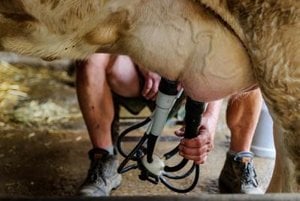While milk prices in the European Union still falling, lack of state subsidies disadvantages Slovak producers to other European countries, farmers say.
“If the government does not give farmers a helping hand, milk production in Slovakia will fall apart,” said Milan Semančík, chairman of the Slovak Agriculture and Food Chamber (SPPK), as cited by the Pravda daily. “Not only thousands of people would lose their jobs but also meadows and fields will not be attended; the country will lose its original look that has been created by generations of farmers.”
Slovak farmers and milk producers suffer from the low milk prices due to an excess on the market as a consequence of Russian embargo on export of selected foods and cancellation of milk quotas.
They fail to respond to price fluctuations due to worse financial condition than farmers in strong European countries, according to Radka Kulaviaková of the Agriculture Ministry.
“Strong export orientation and pro-domestic structure of trade systems help other countries to secure lower impacts of the crisis,” Kulaviaková told The Slovak Spectator.
Additionally, the European Commission does not seek common procedures to solve the crisis within the Common Agricultural Policy, but allows financial and regulatory solutions at the national level, according to Kulaviaková.
“This is just a step to the increase of the unequal position of farmers in economically weaker member states,” Kulaviaková said.
The problem of prices
Milk prices remain low while Agriculture Minister Gabriela Matečná (SNS nominee) excluded the re-introduction of quotas for now. An end to the Russian embargo would not significantly help either, she said.
“Europe would no longer export food to Russia in amount before the embargo whereas Russia launched its own production and imports of food from third countries,” said Matečná on May 18 as cited by TASR newswire.
Until now, surplus of dairy products decreases prices up to 21.4 cents per kilogramme calculated from EU market prices for milk powder and butter, and experts expect decline in price of raw cow’s milk by up to 20 cents per kilogramme, according to the Agriculture Ministry.
“The small market of Slovakia is extremely perceptive to small fluctuations currently affecting market in Europe,” Kulaviaková said.
Stanislav Voskár, chairman of the Slovak Dairy Association, said that average price in Slovakia is about 2 cents higher per kilogramme than in neighbouring states, although prices dropped everywhere in last months.
“Unfortunately, producers will not be able to hold these conditions in long term,” Voskár told The Slovak Spectator.
In comparison, dairy production cost is reaching a value of 40 cents per kilogram and farmers lost about €40 million in revenue this year that means decline of 16.5 percent compared to 2015 and up to 30 percent compared to 2014, said Kulaviaková.
Moreover, Slovak producers struggle with higher interest in imported products, especially from Poland, the Czech Republic and Germany. Though domestic producers have won in distribution of direct milk with a share of 70 percent, in sour milk products they have 48 percent and in cheese and butter just a 33 percent share, Pravda wrote.
In general, dairy products are not extremely popular in Slovakia. The annual average Slovak consumption is about 160 kilograms of milk and dairy products, while the World Health Organisation recommends 220 kilograms per year, according to Slovak Agriculture and Food Chamber (SPPK) spokeswoman Jana Holéciová.
About 10,000 people work in the sector of production and processing of milk while based on a survey of the Slovak Association of Primary Milk Producers, if no appropriate measures are adopted about one-third of farmers want to wind down their milk production. This would mean for the state treasury a lose of aggregate €32 million, of which €19.4 million in revenues from incomes of employers and employees and €12.7 million in costs to secure dismissed dairy farmers, SPPK wrote in its press release.
Farmers ask for money
SPPK proposes to compensate loss financially, in amount of 5 cents per kilogramme that means total support amounting to €43 million.
“Farmers have imposed all options to reduce cost and cannot produce with loss over the long term,” Holéciová said.
However, the Agriculture Ministry does not perceive flat support as the right way forward.
 Dairy producers need state help, ministry starts campaign Read more
Dairy producers need state help, ministry starts campaign Read more “Financial support depends on possibilities of the state budget,” Kulaviaková said.
Today, the government plans to respond rather non-financially by supporting sales, improving transparency, quality checks of imports and restrict imports at dumped prices.
Besides that they will establish a campaign to promote milk and dairy products, which would direct primarily to mothers and young families. The first part of the campaign will take place interactively for four weeks on Fun Radio, owned by Boris Kollar of the We Are Family party.
Other options
The Slovak Dairy Association calls for quick and targeted support to avert termination of primary production of milk and a following harmonisation of systematic supports to the level of established EU member states.
SPPK believes that it is necessary to address consumers.
“We appeal to consumers in order to prefer more dairy products of Slovak producers to anonymous imports without guarantee of quality,” Holéciová of SPPK said.
SPPK set up a crisis unit which would meet for the first time on May 25.
“In the meantime, ministries of agriculture and finance will negotiate about possible support for producers and criteria of compensation,” Holéciová said.






